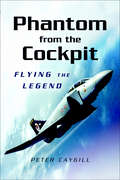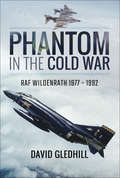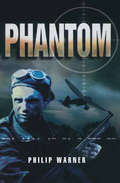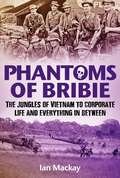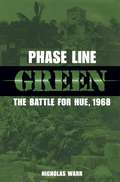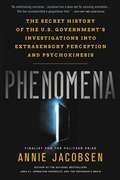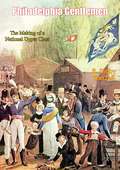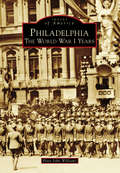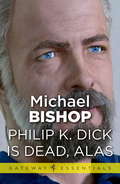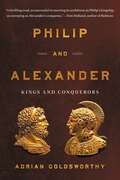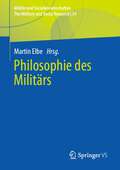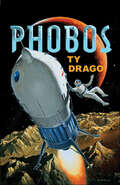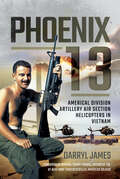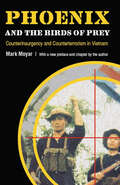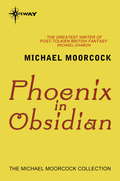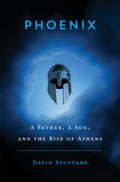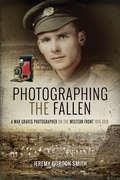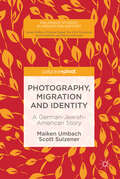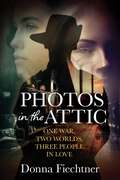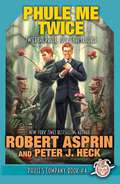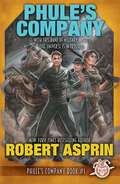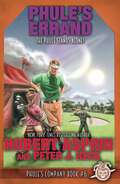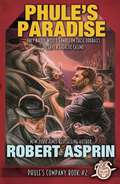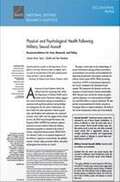- Table View
- List View
Phantom from the Cockpit: Flying the Legend
by Peter CaygillThe McDonnell Douglas F-4 Phantom was the outstanding aircraft in many of the Western World's air forces during the 1960s and 70s. It played a key role in the 'Cold War' and saw action in Vietnam. It first flew in 1958 and went into operation with the US Navy in 1960. During its long front-line life it flew in the roles of an interceptor, fighter-bomber and reconnaissance aircraft.Apart from giving a comprehensive overview of the Phantom's history, this book looks particularly at the experiences of the Royal Air Force and Fleet Air Arm when they received a new model designed with a British Rolls-Royce turbofan instead of the original American power-plant. All was not sweetness and light when the first trials commenced and this book traces its development and progression from being a carrier-based attack aircraft flown by the Fleet Air Arm to the many successful roles it played as a land-based aircraft with the RAF.
Phantom in the Cold War: RAF Wildenrath, 1977–1992
by David GledhillAn RAF veteran presents an in-depth study of one of the Cold War&’s most effective fighter, defense, and reconnaissance planes. The McDonnell Douglas F4 Phantom was a true multi-role combat aircraft. Introduced into the Royal Air Force in 1968, it was employed in ground attack, air reconnaissance and air defense roles. Even after the arrival of the Jaguar in the early 1970s, it continued to play a significant role in air defense. In its heyday, the Phantom was Britain&’s principal Cold War fighter. There were seven UK-based squadrons, two Germany-based squadrons, and a further Squadron deployed to the Falkland Islands.Phantom in the Cold War focuses on the aircraft&’s role as an air defense fighter, exploring its contribution to the Second Allied Tactical Air Force at RAF Wildenrath during the Cold War. Author David Gledhill, who flew the Phantom operationally, also recounts the thrills, challenges, and consequences of operating this temperamental jet at extreme low-level over the West German countryside, preparing for a war which everyone hoped would never happen.
Phantom: Uncovering The Secrets Of The Ww2 Special Forces Unit
by Philip WarnerThe story of the shadowy special reconnaissance unit whose intelligence helped the Allies win World War II. It operated in Italy, Sicily, Austria, France, Belgium, Holland, and Germany. It was at Dieppe with the Commandos, in France with the SAS, at Arnhem with Airborne, and in Germany until the surrender. Phantom—aka GHQ Liaison Regiment—was one of the most secret and most effective of the wartime special regiments. It was formed in 1939 with the mission of finding out exactly where all the Allied forward positions were—a task which required linguistic ability, unlimited tact, and radio expertise. After Dunkirk, its squadrons at first kept an eye on all invasion points, before deploying to Greece and to the Middle East. An indispensable direct communication link between the forward patrols and command headquarters, its members were as varied and colorful as its tasks. Among them were a Cambridge college postgraduate, three professors, a famous actor-playwright, a film star, a famous sculptor, a steward of the Jockey Club, a commissioner of the Metropolitan Police, and numerous authors and journalists. This fascinating history goes beyond Phantom&’s aura of mystery and shows how it was so successful in its role of tracking both allied and enemy movements and relaying vital information direct to commanders.
Phantoms of Bribie: The jungles of Vietnam to corporate life and everything in between
by Ian MackayPhantoms of Bribie is a highly readable blend of an engaging yarn and a fascinating portrayal of operational service in Vietnam as an infantry company commander, leading some 100 fine young national service and regular soldiers in close quarter jungle fighting. Ian's training within the SAS and operational service in Malaya served him well in Vietnam where he was a company commander of Bravo Company 6 RAR. During Operation Bribie he lead his outnumbered company’s desperate bayonet charge, followed by close quarter fighting, against a well dug in and determined enemy. This action sharply illustrated the courage, the battle discipline and the spirit of the well trained Australian combat infantryman. On leaving the Army, Ian excelled in the Australian and international business worlds. A multi-talented sportsman, Rugby Union remained his passion, in which he performed to international level. Ian outlines the difference between leadership and management using many interesting and often humorous examples. Both qualities are vital for successful senior operatives in both civilian and military organisations. Most importantly, as Ian explains, a good leader must also be an effective decision maker and a good communicator. This book is a tribute to Ian Mackay’s qualities as a battlefield commander, an international sportsman, a successful businessman and an entertaining author.
Phase Line Green
by Nicholas WarrThe bloody monthlong battle for the Citadel in Hue pitted U.S. Marines against an entrenched North Vietnamese Army force. By official accounts it was a tactical and moral victory for the Marines and the United States. But here survivor Nicholas Warr describes with urgency and outrage the Marines' savage house-to-house fighting--ordered without air, naval, or artillery support by officers with no experience in that type of combat.Sparing few in the telling, Warr's firsthand narrative tells of desperate Marine suicide charges and of the Marines' selfless devotion to their comrades. His riveting account of the most vicious urban combat since World War II offers an unparalleled view of how a small-unit commander copes with the conflicting demands and responsibilities thrust upon him by the enemy, his men, and the chain of command.
Phenomena: The Secret History of the U.S. Government's Investigations into Extrasensory Perception and Psychokinesis
by Annie JacobsenThe definitive history of the military's decades-long investigation into mental powers and phenomena, from the author of Pulitzer Prize finalist The Pentagon's Brain and international bestseller Area 51. This is a book about a team of scientists and psychics with top secret clearances.For more than forty years, the U.S. government has researched extrasensory perception, using it in attempts to locate hostages, fugitives, secret bases, and downed fighter jets, to divine other nations' secrets, and even to predict future threats to national security. The intelligence agencies and military services involved include CIA, DIA, NSA, DEA, the Navy, Air Force, and Army-and even the Joint Chiefs of Staff. Now, for the first time, New York Times bestselling author Annie Jacobsen tells the story of these radical, controversial programs, using never before seen declassified documents as well as exclusive interviews with, and unprecedented access to, more than fifty of the individuals involved. Speaking on the record, many for the first time, are former CIA and Defense Department scientists, analysts, and program managers, as well as the government psychics themselves.Who did the U.S. government hire for these top secret programs, and how do they explain their military and intelligence work? How do scientists approach such enigmatic subject matter? What interested the government in these supposed powers and does the research continue? Phenomena is a riveting investigation into how far governments will go in the name of national security.
Philadelphia Gentlemen: The Making of a National Upper Class
by E. Digby BaltzellAlthough primarily a Proper Philadelphia story that starts with the city's Golden Age at the close of the eighteenth century, this classic study of an American business aristocracy of colonial stock and Protestant (largely Episcopalian) affiliations is also an analysis of how fabulously wealthy, nineteenth-century family founders in Boston, New York, and Philadelphia supported a series of class-creating institutions outside the family. These institutions included: the New England boarding schools; Harvard, Yale, and Princeton; and urban men's clubs and suburban country clubs. They produced, in the course of the twentieth century, a national, intercity, upper-class way of life. Philadelphia Gentlemen shows how this class reached its peak of power and influence in America on the eve of the Second World War.“Writing both as a Philadelphian and a sociologist, Mr, Baltzell has dissected the upper-class structure of his native city with results as fascinating as they are illuminating.”—John Barkham, Saturday Review Syndicate“In constructing a picture of the proper Philadelphian. Baltzell has made use of masses of printed material and some manuscript sources, there is little on Philadelphia and Philadelphia families which he has neglected....a gold mine of information.”—American Historical Review“Philadelphia Gentlemen says important things about class and power in America, and says it in ways that will interest and fascinate; both sociologists and laymen.”—Seymour Martin Lipset“This is a very, very important book.”—The New York Times Book Review
Philadelphia: The World War I Years (Images of America)
by Peter John WilliamsIn 1914, Philadelphia was the third largest city in the United States with a population of just over one and a half million people. It was fitting, therefore, that during World War I, Philadelphia mobilized itself for the war effort perhaps more than any other large American city. Nicknamed the "Workshop of the World," Philadelphia saw its manufacturing and textile companies converted, almost overnight, to full wartime production. Meanwhile, private and city-sponsored organizations sprang up to send relief to the people of war-torn Europe and prepare for the possibility of American involvement. The Great War would forever alter the city's landscape and its people. Architecturally, demographically, and socially, Philadelphia would experience sweeping change, and the people of William Penn's "greene country towne" would come together as never before to support the war effort at home and their boys abroad.
Philip K Dick is Dead, Alas (Gateway Essentials #381)
by Michael BishopIt is 1982. The United States has a permanent Moonbase. Richard M. Nixon is in the fourth term of the "imperial Presidency." And an eccentric novelist named Philip K. Dick has just died in California.Or has he? Psychiatrist Lia Pickford, M.D., is nonplussed when Dick walks into her office in small-town Georgia, with a cab idling outside, to ask for help. And Cal Pickford, a longtime Dick fan stunned by the news of his hero's death, is electrified when his wife tells him of the visit.So begins a sequence of events involving Cal in the repressive politics of the Nixon regime, the affairs of an aging movie queen, a hip but frightened Vietnamese immigrant and an old black man who works as a groom - all leading up to a fateful confrontation between Dick, Cal, and Nixon himself on the moon.
Philip and Alexander: Kings and Conquerors
by Adrian GoldsworthyThis definitive biography of one of history's most influential father-son duos tells the story of two rulers who gripped the world -- and their rise and fall from power.Alexander the Great's conquests staggered the world. He led his army across thousands of miles, overthrowing the greatest empires of his time and building a new one in their place. He claimed to be the son of a god, but he was actually the son of Philip II of Macedon.Philip inherited a minor kingdom that was on the verge of dismemberment, but despite his youth and inexperience, he made Macedonia dominant throughout Greece. It was Philip who created the armies that Alexander led into war against Persia. In Philip and Alexander, classical historian Adrian Goldsworthy shows that without the work and influence of his father, Alexander could not have achieved so much. This is the groundbreaking biography of two men who together conquered the world.
Philosophie des Militärs (Militär und Sozialwissenschaften/The Military and Social Research #54)
by Martin ElbeDer Band befasst sich mit den philosophisch-ethischen Begründungszusammenhängen des Militärs und des Soldatenberuf in Geschichte und Gegenwart.
Phobos
by Ty DragoLt. Mike Brogue is one of a kind: the only native Martian to be a commissioned officer. He's the military's poster boy for relieving political tensions between Mars Colony and Earth---but he wants nothing to do with it. Brogue is just a man trying to do his job as a tactical analyst and prefers to leave the politics to civilians and government subcommittees.After he manages to save a top Terran official from an extremist plot, however, the only way to avoid the spotlight is to get offplanet. So he pulls some strings and gets shipped to one of the small moons of Mars to help unravel a mystery.Some people at the research station on Phobos---Mars's smallest moon---have been killed, and it seems like the culprit is a native life form. The first military team sent in quickly discovered just how lethal the Phobos beast could be.Brogue, however, doesn't focus on the dust clouds and barren rock that compose the beast's lair but rather turns his attention to the high-tech research facility and its crew.He soon learns that there's no such thing as a safe haven from political upheaval.At the Publisher's request, this title is being sold without Digital Rights Management Software (DRM) applied.
Phoenix 13: Americal Division Artillery Air Section Helicopters in Vietnam
by Darryl James“An informative and colorful memoir about the role that observation helicopters played during the Vietnam War . . . Phoenix 13 delivers.” —The VVA VeteranA collection of war stories closely based on the author’s experiences flying scout/observation helicopters in Vietnam. Storytelling was a daily evening occurrence for the solo scout pilots. These stories, called “TINS,” an irreverent pilot acronym for “this is no shit,” allowed the solo pilots to learn from each other’s experiences and mistakes. The TINS within this collection reveal the brotherhood that developed between pilots and their crew chiefs in combat. The solo pilots relied on their courage, swapping stories and a bit of luck to survive.“A compelling collection of Vietnam helicopter true stories about the aviators in Americal Division’s Artillery Aviation Section in ’68 and ’69. Flying alone, the scout pilots told their exploits to each other daily to learn and to survive from their collective experiences. Hazardous missions are intermixed with occasional humorous details of their off-duty shenanigans. The stories describe the brotherhood that develops between soldiers during combat. From these stories, the author, a decorated former Army aviator, describes his journey through Armor school, flight school and Vietnam.” —General Tommy Franks (Ret), Former Commander in Chief, United States Central Command “A very enjoyable read. Those of us who were there will thoroughly enjoy it, and those who weren’t will learn more about what we did in Vietnam.” —The VHPA Aviator
Phoenix and the Birds of Prey: Counterinsurgency and Counterterrorism in Vietnam
by Mark MoyarThis study explodes prevailing myths about the Phoenix Program, the CIA's top-secret effort to destroy the Viet Cong by neutralizing its &“civilian&” leaders. Drawing on recently declassified documents and interviews with American, South Vietnamese, and North Vietnamese sources, Mark Moyar examines the attempts to eradicate the Viet Cong infrastructure and analyzes their effectiveness. He addresses misconceptions about these efforts and provides an accurate, complete picture of the allies&’ decapitation of the Viet Cong shadow government. Combining social and political history with a study of military operations, Moyar offers a fresh interpretation of the crucial role the shadow government played in the Viet Cong's ascent. Detailed accounts of intelligence operations provide an insider&’s view of their development and reveal what really happened in the safe havens of the Viet Cong. Filled with new information, Moyar&’s study sets the record straight about one of the last secrets of the Vietnam War and offers poignant lessons for dealing with future Third World insurgencies. This Bison Books edition includes a new preface and chapter by the author.
Phoenix in Obsidian
by Michael MoorcockThe second book of The Eternal Champion trilogy.As Erekose, the Eternal Champion, he slew the human race that had betrayed his ideals. And loved Ermizhad, the Eldren princessThe the voices called him and he was powerless to resist. As Fate's soldier, the Eternal One, his lot was to vanquish tyranny. Sent tumbling through the corridors of eternity, he found himself transformed. Now Urlik Skarsol - he is the Prince of the Southern Ice. To find his way home, Urlik Skarsol must take up the Black Sword, the monstrous weapon that demands blood - be it friend's or foe's - before his tortured soul can rest. Before the powers of Evil can be conquered. Before he can rediscover Ermizhad.Before he can know peace again ...
Phoenix: A Father, a Son, and the Rise of Athens
by David StuttardA vivid, novelistic history of the rise of Athens from relative obscurity to the edge of its golden age, told through the lives of Miltiades and Cimon, the father and son whose defiance of Persia vaulted Athens to a leading place in the Greek world. When we think of ancient Greece we think first of Athens: its power, prestige, and revolutionary impact on art, philosophy, and politics. But on the verge of the fifth century BCE, only fifty years before its zenith, Athens was just another Greek city-state in the shadow of Sparta. It would take a catastrophe, the Persian invasions, to push Athens to the fore. In Phoenix, David Stuttard traces Athens’s rise through the lives of two men who spearheaded resistance to Persia: Miltiades, hero of the Battle of Marathon, and his son Cimon, Athens’s dominant leader before Pericles. Miltiades’s career was checkered. An Athenian provincial overlord forced into Persian vassalage, he joined a rebellion against the Persians then fled Great King Darius’s retaliation. Miltiades would later die in prison. But before that, he led Athens to victory over the invading Persians at Marathon. Cimon entered history when the Persians returned; he responded by encouraging a tactical evacuation of Athens as a prelude to decisive victory at sea. Over the next decades, while Greek city-states squabbled, Athens revitalized under Cimon’s inspired leadership. The city vaulted to the head of a powerful empire and the threshold of a golden age. Cimon proved not only an able strategist and administrator but also a peacemaker, whose policies stabilized Athens’s relationship with Sparta. The period preceding Athens’s golden age is rarely described in detail. Stuttard tells the tale with narrative power and historical acumen, recreating vividly the turbulent world of the Eastern Mediterranean in one of its most decisive periods.
Photographing the Fallen: A War Graves Photographer on the Western Front 1915–1919
by Jeremy Gordon-SmithIvan Bawtree has left behind a vast array of archives that tell the story of his work as a photographer with the Graves Registration Units on the Western Front from 1915 to 1919. He traveled to numerous parts of Northern France and Flanders most notably the Ypres Salient to photograph and record graves of fallen soldiers on behalf of grieving relatives. He was one of only three professional photographers assigned to this task, hired by the newly formed Graves Registration Commission in 1915.Through his pencil and lens we gain detailed insight not just into the work he did and the men he worked with, but also aspects of the military zones, the perils of proximity to the Front Line, the devastation of war, and the birth and early work of the Imperial War Graves Commission.Today, the war cemeteries that Ivan saw spring up across battle-scarred landscapes and provide the most widespread and enduring reminder of the scale of loss and sacrifice of the Great War.
Photography, Migration and Identity: A German-Jewish-American Story (Palgrave Studies in Migration History)
by Maiken Umbach Scott SulzenerBetween the 1933 Nazi seizure of power and their 1941 prohibition on all Jewish emigration, around 90,000 German Jews moved to the United States. Using the texts and images from a personal archive, this Palgrave Pivot explores how these refugees made sense of that experience. For many German Jews, theirs was not just a story of flight and exile; it was also one chapter in a longer history of global movement, experienced less as an estrangement from Germanness, than a reiteration of the mobility central to it. Private photography allowed these families to position themselves in a context of fluctuating notions of Germaness, and resist the prescribed disentanglement of their Jewish and German identities. In opening a unique window onto refugees’ own sense of self as they moved across different geographical, political, and national environments, this book will appeal to readers interested in Jewish life and migration, visual culture, and the histories of National Socialism and the Holocaust.
Photos in the Attic: One War. Two Worlds. Three People in Love.
by Donna FiechtnerPhotos in the Attic is a compelling romance that follows the heart-wrenching story of a soldier caught between the love of two women. The tale is brought to life with the discovery of the Thuillier photos that were taken in Vignacourt, France, during World War I. These images hold answers to some questions raised by a current-day character, VALERIE BERNARD, who is a village local. <p><p> In 1916, ROSIE MARCHAND leaves her hometown of Albert on the Somme. A survivor of the war, she finds shelter in the home of her cousin, photographer LOUIS THUILLIER, a shell-shocked veteran of Verdun, who with his wife ANTOINETTE takes pictures of soldiers behind the lines. For Australian BILL FOSTER, the war is a faraway adventure where he is driven to go and join his brother. <p><p> Bill is in love with ISABELLA DE LUCA, a passionate Queensland woman, and promises to return to her. However, MICK DE LUCA, Isabella’s father, vows to do all he can to ensure this doesn’t happen. JIMMY WALTON, Bill’s Indigenous mate, enlists in the army also and they both go off to war together. In the Vignacourt hospital, an injured Bill meets Nurse Rosie. Bill can’t understand why Isabella hasn’t written him any letters. This, along with his brother being declared dead and Jimmy being killed in battle, brings Bill to the verge of a complete breakdown. <p><p> Rosie is his strength during this time, and she nurses him back to health. Their feelings for each other deepen. As the war ends, Bill makes a difficult decision to return to Australia, to Isabelle. This devastates Rosie, and they part in anger. Bill returns home and finds that Isabella was pregnant, but both mother and baby died during birth …. <p><p> Will Bill’s hatred for Mick De Luca rise to the surface? What is his future? Is it in Australia or France, and does it feature Rosie? How do the photos that were found in the attic tie Bill and Valerie Bernard’s lives together?
Phule Me Twice: Twice the Phule, Double the Trouble (Phule's Company)
by Peter J. Heck Robert AsprinFrom a New York Times bestseller, a commander of a legion of misfits takes control of an alien planet in this sci-fi comedy. You can&’t mistake just anyone for a Phule. When the planet Zenobia is invaded, Captain Willard Phule is made their military advisor. The first priority for Phule&’s Company: staying out from underfoot of the peaceful, dinosaur-like Zenobians . . . But, unbeknownst to the Zenobians, they&’re getting two Phules for the price of one. A robot double of Phule appears out of nowhere. And only the real Phule knows who the real Phule is . . . Praise for the Phule&’s Company series: &“A winning story . . . part science fiction, part spoof, part heart-warmer.&” —Publishers Weekly &“Madcap . . . a welcome sendup of military sf.&” —Booklist &“Light without being frivolous, and displays Asprin&’s considerable expertise about fencing and things military, especially leadership.&” —Chicago Sun-Times &“Reminiscent of &‘M*A*S*H.&’&” —Analog Science Fiction and Fact Magazine
Phule's Company (Phule's Company)
by Robert AsprinFrom a New York Times bestseller &“a . . . winning story about a commander who builds a company of misfits . . . into a disciplined military outfit&” (Publishers Weekly). After being court-martialed by the Space Legion for ordering the strafing of a treaty-signing ceremony, multimillionaire Willard Phule receives his punishment: He must command the misfit Omega Company on Haskin&’s Planet, a mining settlement on the edge of settled space. At his duty station, he leverages his personal money and a knack for managing people to get the company to come together as a unit. Phule convinces the governor to leave the contract for an honorary duty up for competition between the Space Legionnaires and the Regular Army. The Army sends some of their most elite troops to take part in the competition, but Phule&’s company operates with their own unique tactics . . . Praise for the Phule&’s Company series: &“Part science fiction, part spoof, part heart-warmer.&” —Publishers Weekly &“Madcap . . . a welcome sendup of military sf.&” —Booklist &“Light without being frivolous, and displays Asprin&’s considerable expertise about fencing and things military, especially leadership.&” –Chicago Sun-Times &“Reminiscent of &‘M*A*S*H.&’&” —Analog Science Fiction and Fact Magazine
Phule's Errand: The Phule Stands Alone! (Phule's Company)
by Peter J. Heck Robert AsprinFrom a New York Times bestseller, a commander in charge of a legion of misfit troops must track down his missing butler in this sci-fi comedy. Phule is without a doubt the only captain in the Space Legion with his own butler, but Beeker has stuck with him through thick and thin. Which is why it&’s incomprehensible to Phule why Beeker has run off-planet without a word—and with Omega Company&’s lovely new medic. Without his right-hand man, Phule has no idea what his left hand is doing. So he takes off after his errant butler, just as General Blitzkrieg decides to make a surprise visit to Zenobia. And the only thing Blitz would like better than catching Phule off guard is to catch Phule AWOL . . . Praise for the Phule&’s Company series: &“A winning story . . . part science fiction, part spoof, part heart-warmer.&” —Publishers Weekly &“Madcap . . . a welcome sendup of military sf.&” —Booklist &“Light without being frivolous, and displays Asprin&’s considerable expertise about fencing and things military, especially leadership.&” —Chicago Sun-Times &“Reminiscent of &‘M*A*S*H.&’&” —Analog Science Fiction and Fact Magazine
Phule's Paradise (Phule's Company)
by Robert AsprinThe New York Times–bestselling novel about a military legion of misfits assigned to defend a space station from a mob boss. THE FEW. THE PROUD. THE STUPID. THE INEPT. It was the perfect solution, put highly connected Captain Willard Phule in charge of the worst dregs of the Space Force. Sure, Phule&’s Company may be a band of rejects and misfits, but they did manage to save the day with their unorthodox methods. Embarrassed, the Space Force may have found the perfect equation for disaster: Assign Phule&’s pack of oddballs to save the Fat Chance Casino from a criminal take over. Phule&’s Company may stop the mob . . . but who will save the casino from them? Praise for the Phule&’s Company series: &“A winning story . . . part science fiction, part spoof, part heart-warmer.&” —Publishers Weekly &“Madcap . . . a welcome sendup of military sf.&” —Booklist &“Light without being frivolous, and displays Asprin&’s considerable expertise about fencing and things military, especially leadership.&” –Chicago Sun-Times &“Reminiscent of &‘M*A*S*H.&’&” —Analog Science Fiction and Fact Magazine
Physical and Psychological Health Following Military Sexual Assault: Recommendations for Care, Research, and Policy
by Terri Tanielian Terry L. Schell Coreen FarrisThis paper reviews data on the prevalence of sexual assault among servicemembers, predictors of disclosure, efforts to improve disclosure, victim needs and DoD efforts to provide necessary resources in the immediate aftermath of a sexual assault. The authors compared civilian and DoD guidelines for care and found them to be generally consistent. However, little is known about the fidelity with which DoD recommendations are implemented.
